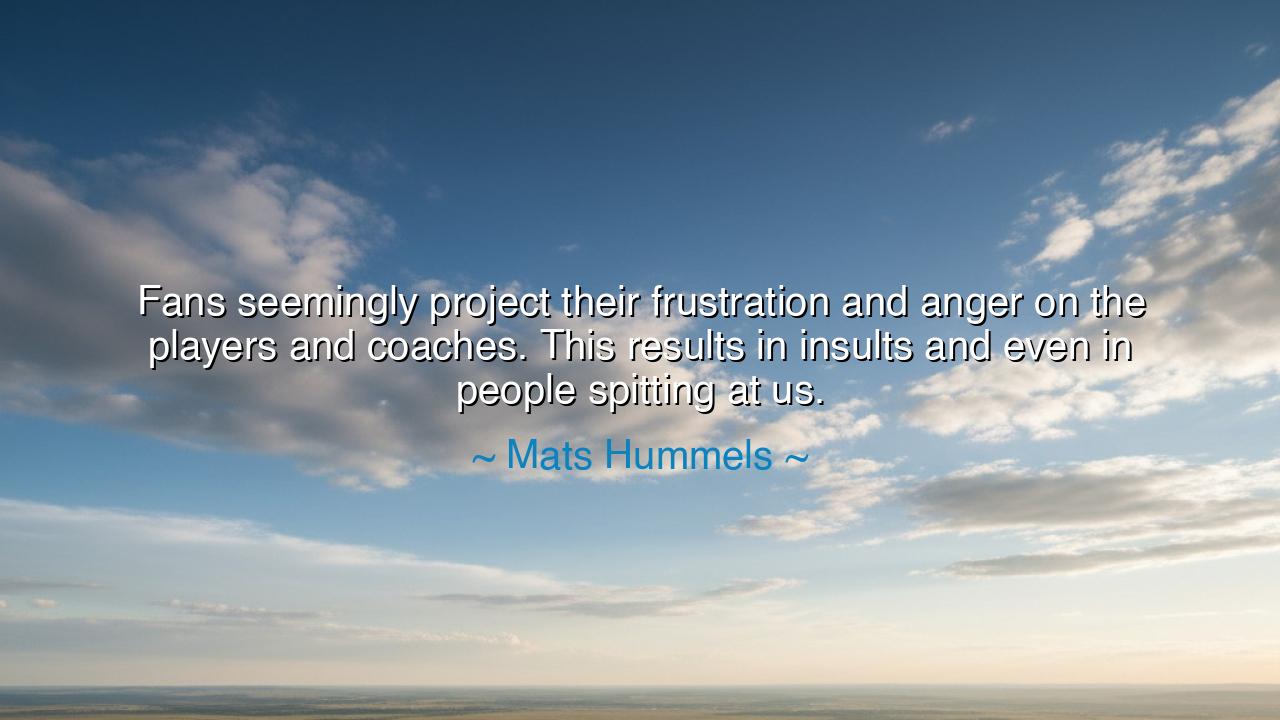
Fans seemingly project their frustration and anger on the players
Fans seemingly project their frustration and anger on the players and coaches. This results in insults and even in people spitting at us.






Host: The locker room was dimly lit, the air thick with the familiar mix of sweat, detergent, and the quiet echo of post-game exhaustion. Outside, the roar of the stadium crowd was fading into the night, replaced by a low hum of distant traffic. Jack sat on the bench, a towel draped over his shoulders, his hands clasped together in silent thought. Jeeny leaned against the wall nearby, her eyes following the slow rhythm of his breathing, sensing the storm of emotions swirling beneath his calm exterior.
Jeeny: (breaking the silence, her voice gentle yet direct) “You know, Mats Hummels once said, ‘Fans seemingly project their frustration and anger on the players and coaches. This results in insults and even in people spitting at us.’”
(She looked at Jack, her tone soft but probing.) “What do you think he meant by that? About the way fans project their anger?”
Jack: (sighing deeply, his voice low and reflective) “I think he’s talking about how easily passion turns into projection. Sports, for so many people, aren’t just games — they’re outlets for emotion, identity, and belonging. When a team wins, fans feel powerful, validated. But when they lose, it’s not just disappointment they feel; it’s frustration with their own lives. And instead of processing that, they direct it at the players — the most visible targets.”
Jeeny: (nodding slowly, her voice steady) “Exactly. It’s not really about the match at all, is it? It’s about people’s need to find somewhere to channel their emotions — their anger, their stress, their feelings of powerlessness. The game becomes a stage for everything they can’t express elsewhere. And the players, the coaches — they end up bearing the weight of all that.”
Jack: (smiling faintly, but without humor) “Yeah. It’s ironic, isn’t it? Fans idolize their heroes when things go well, but when things go bad, that love flips into something darker — entitlement, even hatred. They forget there are human beings behind the jerseys. People who train, who struggle, who feel the sting of loss even more deeply than the fans do.”
Jeeny: (gently, her voice full of empathy) “Yes, and that’s the tragedy of it — the dehumanization. The players become symbols, not people. They’re treated as if they exist only to perform, to win, to give meaning to the lives of others. And when they falter, it’s as if they’ve betrayed something sacred. But really, all that anger, that aggression, it’s just people projecting their own disappointments back onto them.”
Jack: (leaning forward, his voice softer now, almost weary) “It’s the burden of visibility. When you’re in the spotlight, people think they know you, that they have the right to judge you, insult you, even harm you. It’s the cost of fame, I suppose — but it’s a heavy one. The line between admiration and aggression is thinner than most people realize.”
Jeeny: (nodding, her voice tinged with sadness) “And it reflects something deeper about society, doesn’t it? How quick we are to blame others for our own unhappiness. We look for scapegoats — someone to carry our anger so we don’t have to face it ourselves. Sports just amplify that, because it’s one of the few places people feel they can unleash those emotions publicly, without consequence.”
Jack: (sitting back, his voice thoughtful now) “You’re right. It’s not just sports — it’s human nature. We idolize people because we want to believe in perfection. And when they fail, we attack them, because it reminds us that we fail too. It’s easier to spit on a player than to confront your own helplessness.”
Jeeny: (quietly, her voice almost a whisper) “And yet, the irony is that the players — the ones being spat on — are often the ones showing the most courage. They step onto that field, knowing they’ll be judged, knowing they’ll carry the emotions of thousands. That’s its own kind of bravery, isn’t it?”
Jack: (nodding slowly, his voice filled with quiet respect) “Yes. It’s a strange form of resilience. To keep playing, to keep showing up, when you know you’ll be both adored and vilified. That’s what makes Hummels’ words so raw — because they come from that place of knowing what it’s like to be loved one minute and hated the next.”
Host: The locker room fell silent again, the air thick with reflection. The echo of Hummels’ words lingered — a reminder of how easily admiration can turn to anger, and how those who inspire us often bear the weight of our own emotional failures. Jack and Jeeny sat in that understanding, realizing that behind every public figure, every player on the field, was a human being — fragile, fallible, and deserving of empathy.
Jack: (softly, his voice clear and contemplative) “I think that’s the real lesson — to remember the humanity behind the image. The players aren’t symbols. They’re just people, trying their best under impossible pressure.”
Jeeny: (smiling softly, her tone warm but firm) “Exactly. And maybe if we could all be a little more gentle, a little more understanding, we’d realize that the anger we project onto others is often the anger we can’t face in ourselves.”
Host: The night outside deepened, and the stadium lights in the distance finally dimmed to black. Inside, the quiet between Jack and Jeeny was filled not with silence, but with a quiet resolve — an understanding that empathy, not projection, was the only way to bridge the divide between those who watch and those who dare to step into the light.






AAdministratorAdministrator
Welcome, honored guests. Please leave a comment, we will respond soon